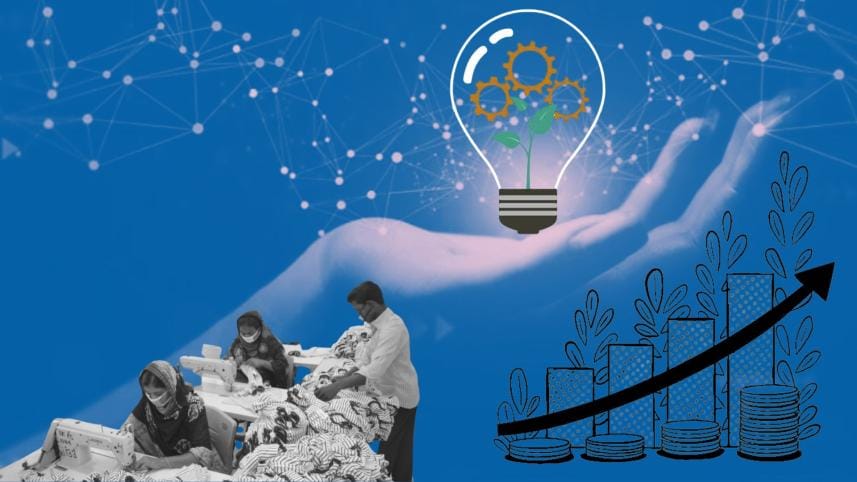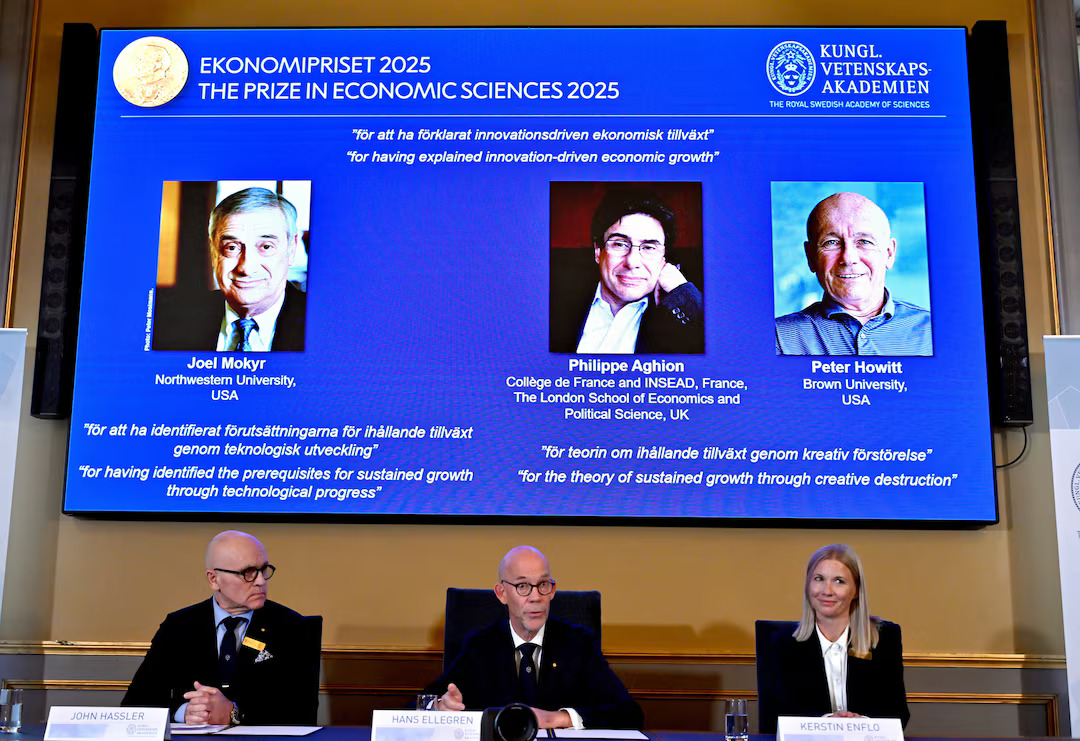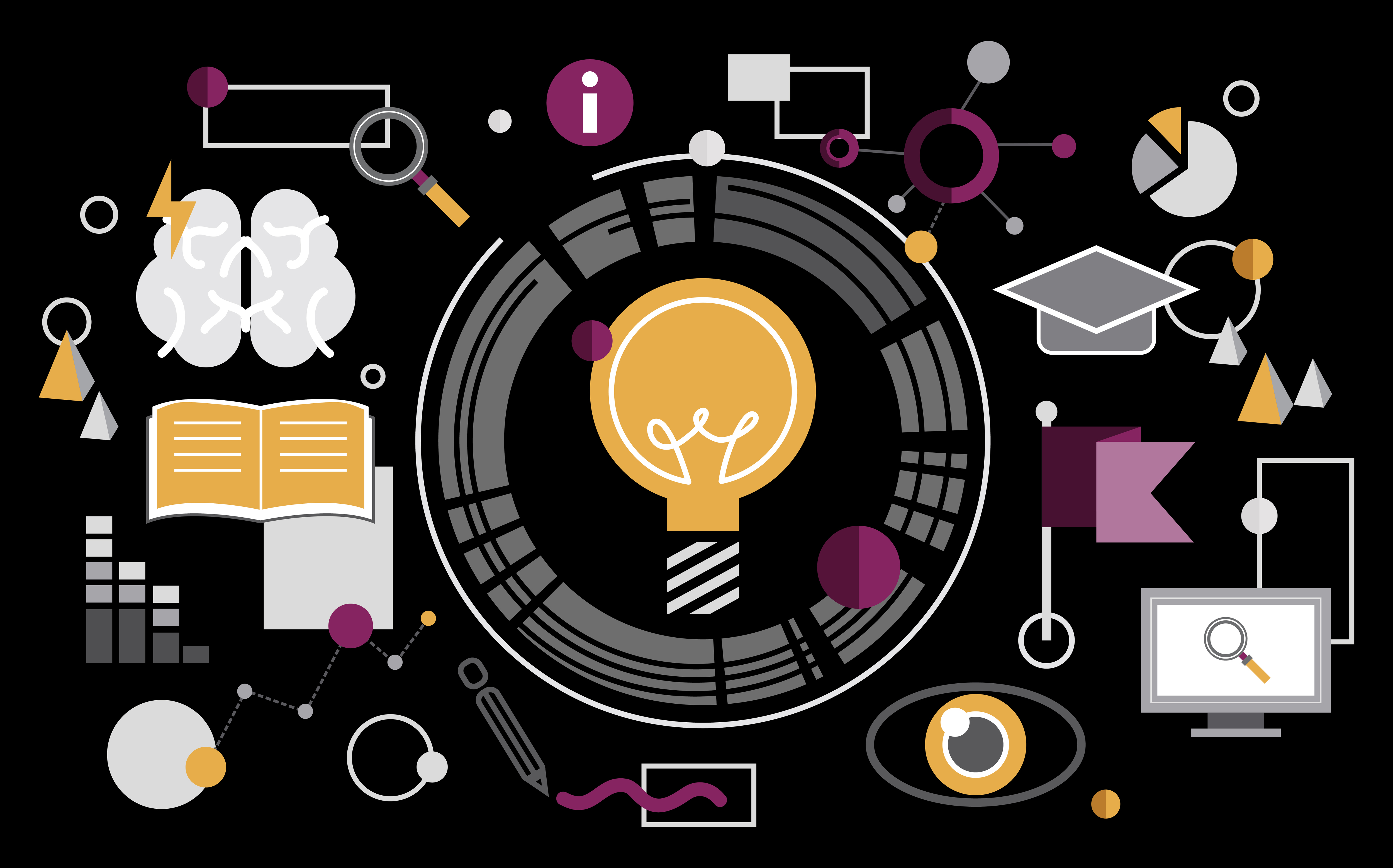What the Nobel Prize in economics teaches us about innovation and survival

The 2025 Nobel Prize in economic sciences was awarded to Joel Mokyr, Philippe Aghion, and Peter Howitt for explaining how innovation drives economic growth. Their work demonstrates that progress is not only about having more people or machines, but also about having better ideas and more effective ways of doing things. This message matters deeply for Bangladesh. For decades, our growth has been powered by the hard labour of millions who send foreign remittances and work in the export-oriented garment industry. But these growth engines are slowing down. To move forward, we need to grow through innovation by creating new products and developing transformational solutions for real problems.
The Nobel-winning economists remind us that the most successful nations are those that encourage people to experiment, invent, and learn. Joel Mokyr shows that societies grow faster when they respect knowledge and curiosity. He demonstrated that for innovations to build on each other, we must not only know what works but also understand why it works scientifically. Philippe Aghion and Peter Howitt explain how "creative destruction," where new ideas replace old ones, keeps economies dynamic and productive. They refer to innovation as destructive since the companies whose technology becomes passé are outcompeted. In simple terms, when people are free to try new things, they fail and try again; the whole country benefits. John Hassler, chair of the committee for the prize in economic sciences, noted, "The laureates' work shows that economic growth cannot be taken for granted. We must uphold the mechanisms that underly creative destruction, so that we do not fall back into stagnation."
Similarly, Dr Fahmida Khatun, executive director of the Centre for Policy Dialogue, aptly noted in a recent op-ed: "This year's Nobel Prize is a prize for a particular way of seeing growth: as a restless, experimental process that constantly replaces old technologies, firms, and even mindsets with better ones." For Bangladesh, this perspective is both a challenge and an opportunity as the country eyes graduation from Least Developed Country (LDC) status. It must now pivot toward innovation-led growth by investing in research and development, strengthening intellectual property rights, and fostering collaboration between universities and industries. What is needed is an ecosystem where innovation is rewarded, not stifled, as Dr Selim Raihan, executive director of South Asian Network on Economic Modelling, notes. He calls for reforming our education system, easing access to finance for startups, and ensuring regulatory predictability.
However, the laureates' work highlights the importance of inclusive innovation. Aghion and Howitt have shown, innovation can exacerbate inequality if not paired with social protections. For Bangladesh, this means ensuring that rural populations, women, and marginalised groups are not left behind in the digital transition. The focus should be on three big changes: (i)education that inspires thinking; (ii) investment in research and development (R&D); and (iii) a friendly environment for innovators.
Our schools and universities should move away from rote learning. Students should be encouraged to ask questions, solve problems, and think independently. Science, technology, engineering, and mathematics (STEM) should be taught in practical, creative ways. Furthermore, Bangladesh, which spends less than one percent of its GDP on research, must boost investment in R&D to at least one percent by 2030. We must also ensure that innovative ideas do not die due to bureaucratic hurdles, corruption, or lack of support. We need simpler policies, better coordination, and fair rules that protect intellectual property, and increased access to funds and mentorship for small entrepreneurs and young inventors. From high-tech factories or city startups to villages, innovation should be promoted throughout the country. Technologies to increase farm productivity, renewable energy and digital health can improve rural life and reduce poverty.
One of the biggest barriers to innovation in Bangladesh is our meeting-driven policy culture. Decisions are not always based on data or research; rather, they are made in lengthy formal meetings, where job hierarchy rather than innovative idea sharing is prioritised. To build an innovation-led economy, we must shift from meeting-driven to evidence-driven policy creation culture, where facts, studies, and experiments guide national decisions. Sadly, only a small fraction of Bangladesh's 17 crore people are active researchers or part of think tanks. Worse yet, research-driven analysis is often disregarded in policymaking. The government should identify, connect, and empower these researchers, universities, and policy institutes so that decisions are informed by real evidence, not routine meetings. Without this shift, innovation will remain a slogan rather than a system.
Bangladesh has shown how resilience and determination can transform a poor country. Now is the time for the next big leap from efficiency to creativity. If we follow the lessons of Mokyr, Aghion, and Howitt, Bangladesh can build an economy where ideas are our greatest export. The future will belong not only to those who work hard, but also to those who think smart. Our goal should be simple: to make "Invented in Bangladesh" a phrase known around the world. That will be our real success, not a medal from Stockholm, but a stronger, smarter, and fairer nation built by our own imagination.
Md Moniruzzaman is professor at Bangladesh Institute of Governance and Management (BIGM), and former additional secretary. He can be reached dr.moniruzzaman@bigm.edu.bd.
Md Mominur Rahman is assistant professor at BIGM, and associate editor of BIGM Journal of Policy Analysis. He can be reached at mominur.rahman@bigm.edu.bd.
Views expressed in this article are the author's own.
Follow The Daily Star Opinion on Facebook for the latest opinions, commentaries and analyses by experts and professionals. To contribute your article or letter to The Daily Star Opinion, see our guidelines for submission.




 For all latest news, follow The Daily Star's Google News channel.
For all latest news, follow The Daily Star's Google News channel. 

Comments